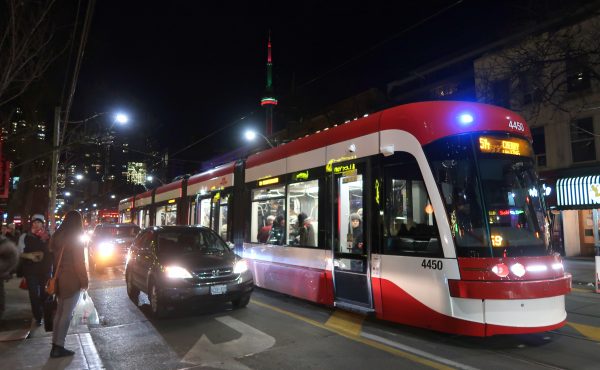
As we wait for (and for some, worry about) work on the TTC’s web trip planner to start and finish, it might be useful to peek at this post on the New York Times City Room blog, as the MTA’s trip planner has won a web award. The gentle jab at the MTA in the first line isn’t so different than the ones many Torontonians give their own staid transit agency.
The Metropolitan Transportation Authority has won an award for an online tool. Seriously.
To be sure, the M.T.A. Web site is not known for being particularly cutting edge. During a brief blackout in parts of Manhattan and the Bronx last June, the M.T.A. Web site went down.
Less than two months later, when crippling thunderstorms flooded and nearly shut down the subway system, the M.T.A. Web site was temporarily bereft of up-to-date service information. In response to withering criticism, the M.T.A. vowed to improve its communications with customers and send out e-mail messages about service disruptions, as other transit agencies do.
—
So it is understandable that New York City Transit — the largest arm of the authority — proudly noted today that its online Trip Planner tool had received a “Best of New York†award from the Center for Digital Government, which provides research and advice on information technology in state and local government.
The MTA trip planner also has a version for mobile devices. Though we have high hopes for the TTC’s trip planner, many folks hope the raw data streams will be released and made public (they are already public property), so the open source geeks can make all kinds of applications on their own. That would be revolutionary.
Photo by Tomas R. Vigo.


6 comments
Why not just let Google do it with their Transit Planner application? Google already made the request for the transit information a little over a year ago; I believe the TTC said they were ‘considering it’.
Google Maps is by far the best mapping program out there, and Google has the best software engineers in NA, if not the world. Why not let them do it for free instead of relying on the people who made our current crappy TTC Website? (Okay, okay, not the same web designers will be doing it, but it’s still the same institution hiring out to the lowest bidder.)
Because, Tom, the TTC has to own its own data, Google could go tits-up tomorrow, and the site has to be provably accessible, which the Transit Planner isn’t. I know you aren’t going to be swayed by these arguments, because you, like many people, have a near-religious faith that handing over public data and services to Google is a great idea.
Of course, by making this “public” data public by, well, publishing it, you’d both get what you want. Google could grab the data feed and do whatever the heck they liked with it.
So could any other developer — even accessibility-minded ones — including those with public funding for better transit tools or, hell, innovative art projects. And the data would be more public than ever.
I’m with Disparishun. I would have preferred to see the TTC put the data in the public domain to see what would happen. If no one came up with an acceptable solution within a year or two, THEN they could contract it out. $1.7M seems like an awful lot of money to bet on one approach to the problem.
I will be happily surprised if the first-generation trip planner is well-done though. And to me that means BETTER than Google Transit – so get to work Trapeze Software!
Hmm… Montreal http://www.stm.info has had its tous azimuts trip planner for years now. Its response time is pretty slow, but it lets you plan a trip by clicking on a map or by entering an intersection, bus stop number, metro station, or point of interest, or any combination thereof. It also gives you nice choices such as calculating by time of arrival or departure, and minimizing the number of transfers or walking distance. It often suggests alternate routes (with the total trip time indicated, too, so you can choose).
As a slight twist, it would be nice to see Metrolinx play an information standard-setting role here.
One challenge, of course, is to get the TTC to start publishing transit data feeds, in order to enable third-party implementations — publicly funded or not — of TTC trip planners.
But that does not a GTA-wide trip planner make. For that we need two things. First, the other GTA transit agencies have to feed data, too. Second, someone’s trip planner has got to incorporate feeds from all of those agencies (TTC, GO, YRT, MT, etc.).
A common standard for transit data feeding is the first step in making that happen. Metrolinx is the only agency well-placed to play that standard-setting role. But have they even considered it?